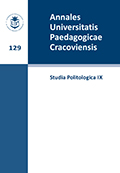Iluzje i aluzje rewizjonistów okresu PRL – przykład Pawła Beylina
Abstract
The article presents the biography and opinions of Paweł Beylin, one of the representatives of the Polish left-wing intelligentsia, and more precisely, the group that was regarded as revisionist by the leaders of the Communist party after the October of 1956. Apart from studying at the university, Beylin also attended the Institute for the Education of the Research Staff (Instytut Kształcenia Kadr Naukowych) - a school that educated the personnel of Marxism-oriented social sciences. In his scholarly and didactic work he was connected with many universities, including art schools. Beside a few early publications he did not have any works in a tendentious ideological overtone. He was engaged in popularizing the history of the social thought and valuable contemporary humanities. Similarly to his friend Leszek Kołakowski, Beylin was a philosopher and a publicist engaged in the disputes over the essence of socialism and the state based on those ideas that were characteristic for the period of the Polish thaw. He was well-known for his criticism of the absurdities of the socialist reality, mocking commentaries and polemics with the main ideologues of that time. His critical attitude and gestures of solidarity with his incriminated friend resulted in excluding him from the Communist party. After March 1968, on the wave of anti-Semitism, he was also dismissed. Soon afterwards, he died. His texts about, among others, the role of intelligence and the obligations of intellectuals were published posthumously in periodicals published on emigration.Downloads
Published
2015-08-07
Issue
Section
Scientific paper
License
Redakcja przyjmuje do druku teksty oryginalne, wcześniej niepublikowane. Treść czasopisma jest dostępna na licencji Creative Commons (CC-BY-NC-ND 3.0 PL)
Licencja ta zezwala na wykorzystanie materiałów opublikowanych w czasopiśmie w celach niekomercyjnych np. komentarza, krytyki, informacji, archiwizacji, nauczania lub prowadzenia badań, z poszanowaniem aktualnie obowiązującego prawa autorskiego (ustawa z dnia 4 lutego 1994 r. o prawie autorskim i prawach pokrewnych Dz.U. 1994 nr 24 poz. 83 z poźn. zm.). Zgodnie z wymogami licencji, konieczne jest dokładne podanie źródła cytowania lub parafrazowania oraz zachowanie tekstu w oryginalnej postaci (zakaz tworzenia utworów zależnych).

